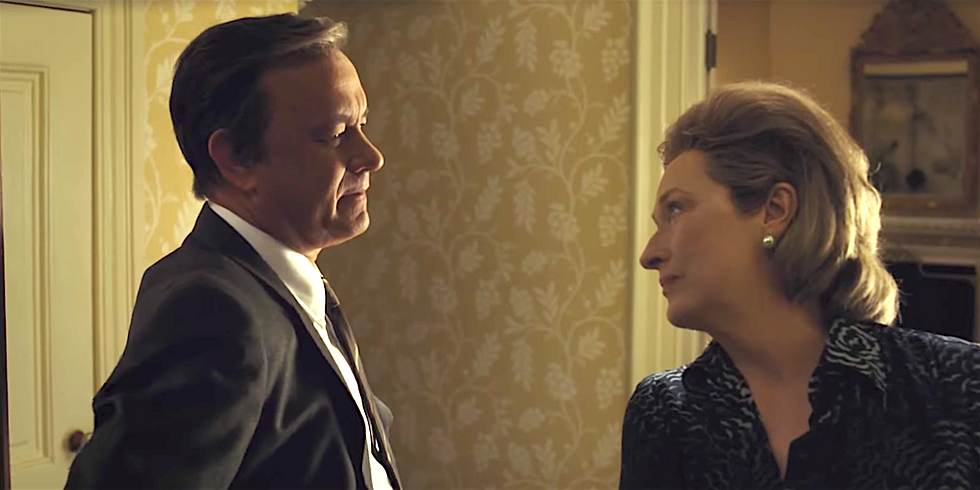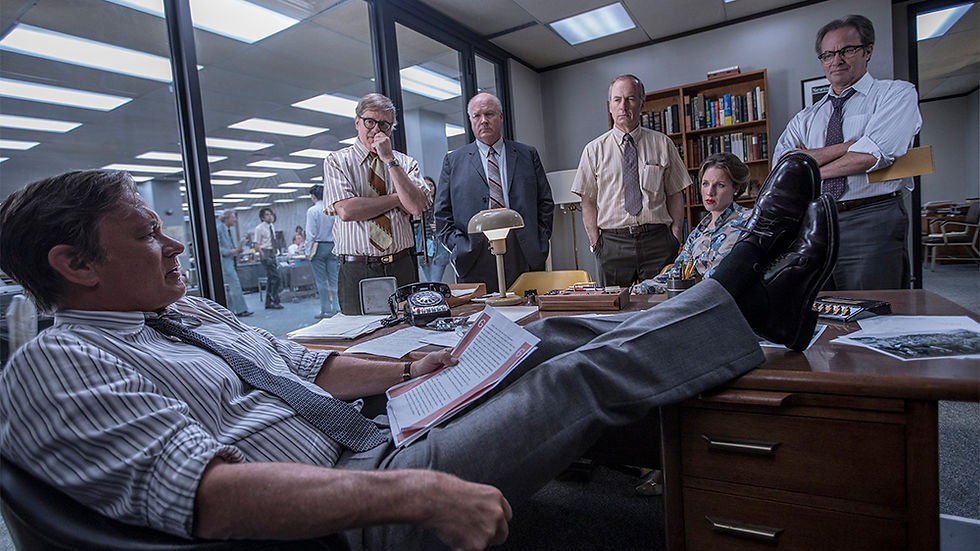The Post
- Ben Pivoz

- Jan 20, 2018
- 4 min read
Updated: Jul 9, 2021

Steven Spielberg, Meryl Streep and Tom Hanks all bring their respective talents together for the based-on-fact drama The Post, a very timely film about a battle between the United States government and the press.
After establishing the discrepancy between the government’s official statement on Vietnam and the reality of that particular war, The Post takes viewers behind the scenes at the Washington Post. The newspaper is being run by Kay Graham (twenty-time Oscar nominee, and three-time winner, Streep), who inherited the paper after the death of her husband. Despite her years of experience in the industry, the board (mainly represented by Bradley Whitford’s skeptical Arthur Parsons) has doubts about a woman’s ability to lead a business. Meanwhile, the man running her newsroom, Ben Bradlee (five-time Oscar nominee, and two-time winner, Hanks), is struggling to make his paper as relevant as the New York Times. Then, the Times publishes a story based on leaked government papers that details the way the government had lied to the American people about Vietnam for over thirty years.
After the Times are forced to stop publishing the papers under the threat of legal action, the Post acquires some of the papers. They now must decide if their responsibility to the American people outweighs their fear of reprisal from the American government.
Though the film starts slow, seven-time Best Director Oscar nominee (and two-time winner) Spielberg and his screenwriters (Liz Hannah and Josh Singer (winner of a Best Original Screenplay Oscar in 2016 for co-writing Spotlight) do a good job of building tension throughout the story. Despite knowing how the story would turn out, I still found it compelling. I can certainly see how this could be suspenseful for viewers who are not coming in already familiar with the outcome. Spielberg and his cast and crew are skilled professionals and this is a well-structured and very focused film.

It is definitely an interesting time to make a movie that positions reporters as dedicated heroes and loyal civil servants to the American people. At a time when the government and the press have an extremely combative relationship, a true story detailing a previous battle between the government and the press seems very fitting. Granted, the story of The Post is not exactly what is going on today. But there is a fear among some that the ability of the press to report on the government is in jeopardy and this is a film about that very battle.
Unsurprisingly, the cast is very good. Streep and Hanks play off of each other very well as a woman split between her duty to her investors and her duty to her readership and a man determined to create the most compelling news section possible regardless of risk. As his most trusted reporter, Better Call Saul’s Bob Odenkirk does a lot of the heavy lifting as far as plot advancement goes. While the others (Streep’s Graham, Hanks’ Bradlee, Whitford’s Parsons, Tracy Letts (also seen in 2017 in The Lovers and Lady Bird) as Graham’s trusted advisor Fritz and Bruce Greenwood (who also played a member of the government as the US President in the recent Kingsman sequel) as her close friend and former Secretary of Defense Robert McNamara) sit around debating ethical, moral and financial responsibility, his Ben Bagdikian puts himself at risk trying to find the story.
Odenkirk takes a supporting character and really makes him the heart of the film. If that part of the story did not work, then The Post would just be a bunch of people arguing in circles for 109 minutes (not including the end credits). As it is, its singlemindedness is both a positive and a negative. The setup, though necessary for making sense of everything and everyone in the story, takes a long time to get through. So it takes a while for things to really get going.

I appreciate how Hannah and Singer were able to drop in personal details about their characters during their conversations about these papers. It gave them depth in a story that is really much bigger than the individual people involved. However, many of those conversations felt repetitive. Though I believe that they talked things over many times, each characters’ stance was established pretty quickly, so all of their arguments started to feel the same after a while. The dialogue is good, but nothing was really getting accomplished. However, once the heat gets turned up and they have some really big decisions to make, the film delivers with some powerful, dramatic speeches.
The Post is not a great film. It is slow to get going and a little preachy with all of its speeches about the importance of the free press (not that I disagree with that sentiment; I would just have preferred a little more subtlety considering that freedom of the press is a theme that is automatically baked into this particular story). It is, however, a good film, with good performances (I did not even mention The Americans’ Matthew Rhys as an informer, American Horror Story’s Sarah Paulson as Bradlee’s wife, Alison Brie (star of Netflix’s GLOW) as Graham’s daughter, comedian David Cross as a reporter and Jesse Plemons (recently seen in both American Made and Hostiles) and Silicon Valley’s Zach Woods as legal counsel, just to name a few) and some well-written dialogue.
Spielberg does not add in any bells and whistles here. He takes a story that we all need to be reminded of right now and tells it. When it is this interesting, that is enough.
3½ out of 5
Cast:
Meryl Streep as Kay Graham
Tom Hanks as Ben Bradlee
Bob Odenkirk as Ben Bagdikian
David Cross as Howard Simons
Tracy Letts as Fritz Beebe
Bradley Whitford as Arthur Parsons
Alison Brie as Lally Graham
Jesse Plemons as Roger Clark
Matthew Rhys as Daniel Ellsberg
Bruce Greenwood as Robert McNamara
Sarah Paulson as Tony Bradlee
Directed by Steven Spielberg
Written by Liz Hannah and Josh Singer




Comments